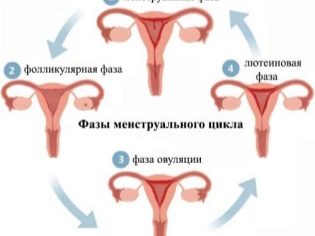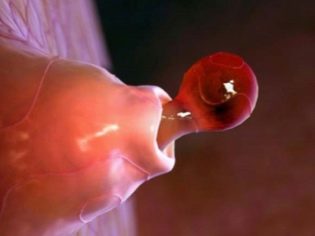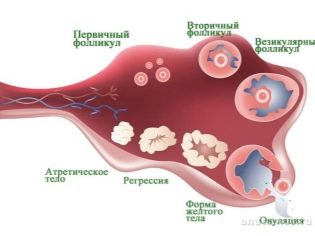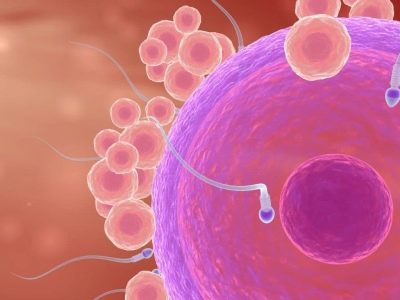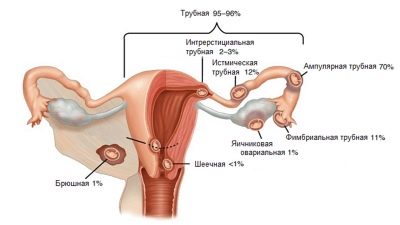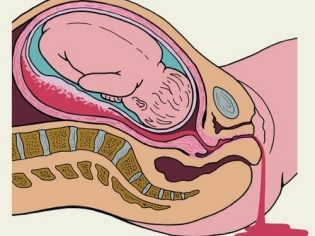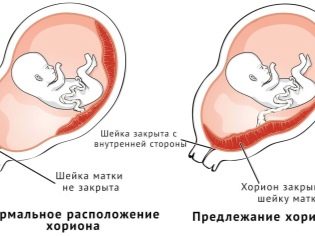Could there be menstruation in early pregnancy?
The absence of regular menstruation is almost always a sure sign of the onset of pregnancy. It is the lack of menstruation in due time and makes a woman usually buy a test or do a blood test to find out if she wears a baby under the heart. But sometimes, after conception, a woman may notice bloody menstrual-like discharge from the genitals. Can menstruation continue in early pregnancy, we will tell in this article.
Monthly mechanism
To understand it, you need to be clear about exactly how menstruation takes place in the female body. In medicine, they are often called regullami, since the monthly - a regular phenomenon. Bleeding is accompanied by rejection of the mucous membranes of the uterus. The main reproductive female organ gets rid of the endometrial functional layer only if there is no need for it - there is no pregnancy.
Usually, a woman’s menstrual cycle after puberty lasts 28 days. However, longer and shorter cycles (20-21 days or 34-35 days) are also considered perfectly normal, provided that they are regular. The first day of menstruation - the beginning of a new menstrual cycle. At the end of the physiological bleeding, the follicular phase begins.
The ovary matures in the ovaries, which is to emerge from the follicle approximately in the middle of the cycle. When the follicle becomes large, under the action of specific hormones it breaks, the egg leaves the ampullary part of the fallopian tube. This process is called ovulation. If on the day of ovulation or a day later the egg cell meets with the male reproductive cell - the sperm cell, then conception and the onset of pregnancy are likely.
If conception does not occur, the egg cell dies 24-36 hours after it leaves the follicle. The villi inside the fallopian tube push it into the uterine cavity. The mucous membranes of the reproductive organ thicken under the action of progesterone from the moment of ovulation. The functional layer is necessary so that the fertilized egg can be fixed in it. If a dead egg descends into the uterus, the progesterone level decreases in about a week. The luteal phase of the menstrual cycle (its second half) ends.
The unclaimed physiological layer of the endometrium of the uterus begins to reject — menstruation begins, and at the same time the next menstrual cycle.
If conception took place, the level of progesterone remains high. Approximately 8-9 days after ovulation, the fertilized egg, passing through the fallopian tube, enters the uterus, is introduced into the endometrium that is loose and “prepared” for implantation. The hormone hCG begins to be produced, for which the chorionic villi are responsible after successfully fixing the ovum. Chorionic gonadotropin stimulates the additional production of progesterone. "Fit" hCG, progesterone is not reduced. Rejection of the endometrial layer does not occur. Monthly does not occur.
Menstrual blood is called blood very conditionally, because it does not have the ability to clot. In fact, during menstruation, the menstrual fluid is secreted from the woman’s genitals, which is only partially composed of blood and uterine membranes. In addition to them, mucus secreted by the cervix, fluid secretion of the vaginal glands, a number of enzymes that prevent the bloody fluid from coagulating are determined in the fluid.
The average amount of menstrual fluid per cycle is about 50-100 milliliters. There are less and more abundant periods. However, the volume of fluid lost less than 50 ml or more than 250 ml is considered a sign of pathology - such a woman should definitely be examined and find out the causes of the violation.
Are there any after conception?
By nature itself everything is provided so that after conception, if it took place, there were no menstruation. From the point of view of physiology, the onset of menstrual bleeding becomes completely impossible, but in practice anything can happen, because this is not about a machine or a mechanism, but about a living human body.
It is no coincidence that some women, when referring to a gynecologist, claim that they came for the first time only because other symptoms of pregnancy appeared - their breasts increased, their weight began to grow, and some even had the first fetal movements. Essentially, during first trimester these women continued with monthly bleeding, which they took for menstruation. In the people before about such "monthly" against the background of pregnancy they said that "the fetus washes."
What really happens? From the point of view of medicine, there is a small chance that in the follicular phase of the menstrual cycle in a woman, not one, but two or three eggs will mature. Their release of their follicles will not necessarily be simultaneous. Imagine that one egg came out, “waited” for a day and died without meeting the spermatozoon. She sinks into the womb. In the body, processes begin prior to normal menstruation.
But the second egg may well be fertilized. As long as it moves into the uterine cavity through the tube (this is about 8 days), the menstruation due to the death of the first egg may well begin. However, such periods will be significantly different from normal. A woman can pay attention to the fact that the discharge, although it came in time, was more scarce, did not last 6 days, as usual, but only 3-4 days or less.
It must be said that this is the only more or less explainable and logical reason for the onset of menstrual discharge during pregnancy in the earliest terms. In a month, in such circumstances, periods will not come, as the pregnancy will already develop in full swing.
Women claiming to have monthly continued every month until the end of 3-4 months, wrong. Even if they had menstrual bleeding in the first month because of the second egg, in the following months it was not a matter of menstruation, but of the pathologies of pregnancy - the threat of miscarriage, hormonal disorder or other causes.
Sometimes, gynecologists do recognize that a woman may have a bloody daub in the days when her period began before the onset of pregnancy. The reason for this phenomenon is not fully understood, and experts are inclined to believe that the hormonal memory of the body is to blame. In fairness it should be noted that such a phenomenon in practice is very rare - in about 0.5-1% of cases.
They say about secretions of unclear etiology if a complete and detailed examination of a pregnant woman does not reveal the slightest disturbance in her condition - the woman is healthy, there is no threat of miscarriage, placenta previa, the hormone balance is normal, the fetus is healthy and develops according to the gestational period.
Usually, such unexplained secretions pass by the end of the first trimester and no longer return to the birth. Given the rarity of this phenomenon, you should not especially expect that the bleeding that appeared in the early stages is such a harmless and mysterious menstrual-like bleeding. Most often the reasons are completely different, more dangerous and threatening.
To answer the main question of this article - can there be menstruation in the early stages, you need to clearly understand that in 99% of cases this can not be. And only in rare cases can there be menstrual bleeding (not menstruation!) Due to the second egg. In all other cases, the appearance of bleeding is an alarming symptom that has nothing to do with the variants of the physiological norm.
Causes of blood in the early stages
So, complete and harmless periods during pregnancy are impossible. So what are the reasons may have bloody discharge, which women take for menstruation?
Implantation
Implant bleeding is not a universal phenomenon and is not common to all. But if it happens, then there is nothing dangerous in it. Selections of a blood-like or spotting nature may appear about a week after ovulation, when the fertilized egg reaches the uterine cavity. Usually, a woman who does not realize that conception could have happened is surprised and thinks that her period for some reason just came ahead of time for about a week.
In fact, the blastocyst is introduced into the functional layer of the endometrium of the uterus. During this process, the integrity of the layer is broken and possible small bleeding. Such secretions are usually scanty, they are not accompanied by pain. The color of the discharge can be from creamy pink to pronounced bloody. The amount of discharge is small. Usually, implant bleeding lasts from several hours to a couple of days, not more.
Tests will show pregnancy in about ten days, and a blood test for hCG will determine it in three to four days after a strange and untimely “smear”.
Implantation bleeding does not affect the development of pregnancy, the fetus and the health of the future mother does not harm. For many women, it does not occur at all or scanty discharge goes unnoticed.
Hormonal imbalance
The cause of bloody discharge, including in the days in which the woman had previously been menstruating, may be a shortage of the hormone, progesterone, which is important for carrying a child. A sufficient level of this hormone is necessary to prevent another menstruation while the woman is carrying the baby. In addition, progesterone suppresses the mother's immunity, provides nutritional reserves for the baby, maintains smooth muscles of the uterus in a calm state, preventing the tone and hypertonia of the uterine muscles.
The cause of the shortage of progesterone most often are the pathologies of the corpus luteum of the ovaries, chorion, chronic diseases of the kidneys and liver, the thyroid gland, pituitary disorders, and gynecological inflammatory diseases of the ovaries, fallopian tubes, and endometrium. Previously performed abortions are another reason for which, during a desired pregnancy, the pathological lack of progesterone can be absent.
The reason for the appearance of bleeding may be due to a lack of the hormone hCG. If it is not enough, then stimulation of progesterone production will be insufficient. Hormonal bleeding very often leads to spontaneous abortion if left unattended. However, with timely access to a doctor, a woman is prescribed hormonal treatment - progesterone drugs, so the deficiency of this essential substance can be eliminated.When such a problem occurs, hormonal treatment is usually prescribed for a long course, up to the 16-18 week of pregnancy, when the risk of miscarriage is considered less likely.
Hormonal secretions can be different in intensity, color and duration. What they are depends on the individual characteristics of the organism. Most often, women complain of the appearance of bloody red or brownish discharge with mucus, but pink and bright orange discharge are also characteristic of the pathology.
The more abundant the discharge, the more likely the adverse outcome. When blood clots appear in them, it is often a question of a miscarriage that has begun.
Additional symptoms - pulls the lower abdomen, aching lower back, there is a weakness and deterioration of health. Such signs are not always observed, sometimes the only sign of hormonal deficiency is abnormal discharge from the genital organs.
Injury
The female genital tract during pregnancy from the very first months of her become more vulnerable, because progesterone has a softening effect on the mucous membranes. Therefore, to injure the vagina or cervix becomes easier than ever, without even performing any dangerous actions. During pregnancy mucous membranes are better supplied with blood, the amount of which, by the way, also increases. That is why even a microtrauma of the vagina can lead to the appearance of bleeding that a woman may mistaken for menstruation.
Typically, a woman receives such injuries during sex, especially if partners with the onset of an “interesting position” did not reduce the intensity of frictional movements, continue to use sex toys and often make love in general. After intercourse in this case, a woman may notice a bloody scarlet discharge - the blood does not have time to change color, because it immediately flows out.
Discharge while not abundant, not accompanied by pain, the child does not harm.
If the cervix is injured, the discharge is stronger, with mucus. A woman can be injured during masturbation, with the introduction of a tampon (which is prohibited during pregnancy!), As well as during a vaginal examination by a gynecologist.
Post-traumatic discharge is not long-lasting, they usually completely stop after a few hours. If you do not put the infection in the place of injury, then there will be no inflammation and bearing a baby will not be threatened. In some cases, with excessive and clean bleeding of the vagina, the doctor may prescribe a more benign mode of intimate life to the woman, as well as iron preparations and hemostatic agents that improve blood clotting.
Ectopic pregnancy
If the fertilized egg is not fixed in the uterus, but in the fallopian tube, cervix, or even out into the abdominal cavity, then for some time a woman may not even be aware of this. Tests will be "striped" and even signs of toxicosis are quite possible. However, pregnant may be disturbed by a bloody brownish discharge, which is initially associated with an insufficient level of hCG, because it will be produced less with ectopic adherence of the ovum.
As the embryo grows, the walls and membranes of the organ to which the egg is attached will stretch. There are quite localized abdominal pains, the discharge increases. Severe cutting pains, the occurrence of painful shock, loss of consciousness, profuse scarlet bleeding with large clots can speak about rupture of the tube or the occurrence of cervical bleeding. The gap threatens to end 8-12 weeks, if the fact of ectopic pregnancy was not installed on an ultrasound before this period.
Ectopic pregnancy can be deadly for a woman. For the fetus, there is always only one prognosis - it cannot survive anywhere except the uterus.An ectopic pregnancy needs surgery, and the sooner this is done, the more chances a woman will have for a future pregnancy.
With early detection of pathology, doctors can save the fallopian tubes, extraction of the ovum will be carried out by laparoscopic method. With late handling, alas, often the pipe can not be saved. In cervical pregnancy, it is often necessary to remove the entire uterus, but cases of attachment of the ovum in the cervix are a relative rarity.
Miscarriage
The threat of miscarriage in the early stages can occur for a variety of reasons, and not always these reasons will be obvious. The fetus can be rejected by the mother’s own immunity, it can be unviable due to gross genetic pathologies, developmental anomalies. The threat of miscarriage often occurs in women who have chronic diseases, problems with reproductive health of infectious and non-infectious origin.
Pregnancy in the early stages is very fragile. It is possible for the future mother to break her normal course of life, her psychological experiences, stresses and shocks, hard physical work and athletic exertion, bad habits (smoking and alcohol), night work. Miscarriages can be habitual, repeated. In this case, it is likely that the next one will occur at exactly the same time as the previous one.
The threat of miscarriage is often accompanied by secretions from the blood. Their intensity, color, consistency depend on the true cause of the threatening condition. With the appearance of discharge, similar to menstruation, the woman must be examined by a gynecologist and an ultrasound.
With a threatening miscarriage, the ovum is usually not deformed, but the uterus is in an elevated tone. With the start of miscarriage, the discharge is more abundant, the woman complains of increased anxiety, that she has a stomach ache, pulls the lower back. Pain can be cramping. On ultrasound is determined deformed fertilized egg of irregular shape. With an accomplished miscarriage, the bleeding is severe, the pain is cramping, there are large blood clots and fragments of the endometrium and the ovum in the discharge. On ultrasound, the ovum may not be detected or its remains are determined. Fetal heartbeat is not recorded.
Modern medicine has many ways to help a woman and her child with the threat of miscarriage and even with a miscarriage that has begun. But with the accomplished doctors, alas, can not do anything. The only solution would be curettage of the uterus, in order to avoid a delay in the part of the fetal membranes and the occurrence of subsequent inflammation and sepsis.
Preposition chorion, detachment
If the fertilized egg is not fixed in the bottom of the uterus, but in its very bottom, then the occurrence of bleeding due to small chorionic detachments is possible. The presentation can be complete when the entire cervical area of the cervix is blocked, or it can be partial. It is possible to diagnose such pathology only by ultrasound.
The reasons for which pathology occurs most often have a maternal factor, that is, are directly related to the burdened history - the presence of scraping and abortions in the past, the presence of a tumor in the uterus, polyps, which prevented the blastocyst from consolidating where the development of the fetus would be safer.
The uterus increases in size, new blood vessels appear in the chorion, which should turn into the placenta by the beginning of the second trimester of pregnancy. Detachment occurs when the presentation due to injuries of blood vessels.
If the blood does not come out, but accumulates between the uterine wall and the chorion, a retrochorial hematoma is diagnosed. With her discharge may not be, and this is the most unfavorable sign.
If the blood comes out, there is a chance that the hematoma will resolve and the pregnancy will develop further.The excretions, if they appear, are most often brown. If red blood has gone, this is a sign of fresh detachment, and the probability of losing a child due to total detachment is higher.
Fading Pregnancy
A child in the womb may at any moment cease to develop and die. The reasons can be many - from chromosomal abnormalities that made the continued existence of the crumbs impossible, to the external adverse effects of toxins, radiation, medicines, infectious diseases.
Until a certain time, a woman may not guess what happened, until she sets off for an ultrasound or she begins to have discharge resembling menstruation. The dead fetus is usually rejected by the uterus 2-3 weeks after the death. During this time, a woman can pay attention to the fact that her signs of toxicosis have disappeared and her chest has stopped hurting. If there was no toxicosis, the sensations will not change.
Discharges at the rejection stage usually begin as menstruation - with daubing, which gradually “diverges”, it becomes more abundant. The color changes from brownish to scarlet, bright, cramping pains appear, blood clots appear in the discharge. Further flow takes place in the miscarriage scenario.
How to distinguish from bleeding?
Menstrual blood is darker, resembling venous, whereas with most pathologies of pregnancy, the discharge is either brownish or scarlet — the color of arterial blood. To guard the pregnant should and related symptoms and changes in their own condition. Any discharge, even if they are not bloody, accompanied by pain, a feeling of heaviness in the abdomen, pulling lumbar pain, a false desire to empty the intestines, are dangerous.
If the fact of pregnancy is already proven by tests and examinations, to treat the bleeding should be exclusively as pathological. When even insignificant “daubs” appear, one should consult a doctor, and with abundant sudden bleeding, call an Ambulance and wait for the brigade to take a horizontal position.
Statistics show that in 85% of cases with timely treatment of women for help to doctors, pregnancy can be saved. The only exceptions are cases of a frozen, ectopic pregnancy, a miscarriage, and whelping.
If the fact of pregnancy is not yet obvious and the bleeding started before the delay of menstruation or a few days after the delay, the best way to establish the truth is a pregnancy test. You can make it from the first day of menstruation. Prior to this, a woman will receive a blood test for HCG. If the diagnosis shows the presence of pregnancy, with complaints of bleeding should also consult a doctor.
It should be remembered that the bleeding menstrual discharge during pregnancy is not similar to the usual monthly - they are less abundant. You can also find a few dozen differences in the woman’s own feelings.
Reviews
According to the reviews that women leave in the thematic forums, it can be assumed that many women often face such a phenomenon as biochemical pregnancy. It occurs when the fertilized egg dies or peels off almost immediately after implantation. In this case, a woman may have a pregnancy test, but her periods will still come, but with a slight delay.
If a woman does not plan a pregnancy, she may not guess what is happening and simply perceives her period after a delay, as a consequence of fatigue, stress, recently transferred flu or ARVI. If the child is planned, then the woman is more closely monitoring her state of health in the second half of the cycle and, most likely, she will notice the early signs of pregnancy.
Biochemical pregnancy does not affect the ability to conceive a baby in the next cycle. A visit to the doctor is not required, since it does not count as a miscarriage.Women claim that biochemical pregnancy is indicated not only by a small delay, but also by more abundant than usual monthly ones.
Stories that menstruation went every month up to 6 months of pregnancy are usually told from a third person - “my friend”, “a neighbor told a case” and so on. That is what causes the share of common doubt. Apparently, the stories of the long-term threat of termination of pregnancy of some mythical characters are retold in this vein.
Lovers to read reviews can advise only one thing: with the appearance of blood discharge, an urgent need to go to the doctor if there is a pregnancy. If she is in question, you can also go to the doctor to dispel doubts or to save the long-awaited baby, if at the very beginning of the pregnancy something threatens him.
The normal occurrence of monthly or similar allocation for any period of pregnancy can not be considered. On whether you can go monthly during pregnancy, see the following video.



